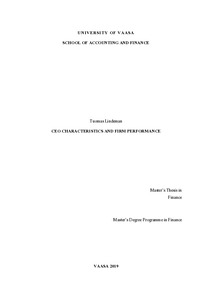CEO Characteristics and Firm Performance
Lindeman, Tuomas (2019)
Kuvaus
Opinnäytetyö kokotekstinä PDF-muodossa.
Tiivistelmä
CEOs of large companies have a lot of power in the company-wide hierarchy and their actions are followed closely by the news media, financial analysts and private investors, for instance. For this reason, they are interesting targets for further investigation in the academic world as well. Especially, the influence of various characteristics related to the CEOs are of special interest. Previous academic research shows that different characteristics connected to the CEO can influence a firm’s financial performance either in a positive or negative manner. This study examines the relationship between these CEO characteristics and firm financial performance through six individual measures: age, gender, experience, CEO/Chairman duality, salary and firm ownership. Firm financial performance is proxied through the profitability indicator ROA and the valuation measure Tobin’s q. It is expected that certain characteristics have significant influence on firm performance.
The study examines a panel data of 291 individual S&P 500 companies and 482 CEOs of those companies through a period of seven years, 2010-2016. The individual variables are obtained from Execucomp and Datastream. Panel regressions with period-, cross-section- and industry-fixed effects are utilized in the study to form the results.
The empirical findings of the study show that female CEOs tend to affect firm performance positively. CEO experience, measured as the time the individual has held the position in the company, and CEO/Chairman duality are also shown to have a positive relationship with the financial performance of the sample firms. The remaining characteristics yield inconclusive or insignificant results in regard to firm financial performance. Due to the issue of endogeneity affecting most corporate governance studies, the results of the study should be treated as rather tentative.
The study examines a panel data of 291 individual S&P 500 companies and 482 CEOs of those companies through a period of seven years, 2010-2016. The individual variables are obtained from Execucomp and Datastream. Panel regressions with period-, cross-section- and industry-fixed effects are utilized in the study to form the results.
The empirical findings of the study show that female CEOs tend to affect firm performance positively. CEO experience, measured as the time the individual has held the position in the company, and CEO/Chairman duality are also shown to have a positive relationship with the financial performance of the sample firms. The remaining characteristics yield inconclusive or insignificant results in regard to firm financial performance. Due to the issue of endogeneity affecting most corporate governance studies, the results of the study should be treated as rather tentative.
